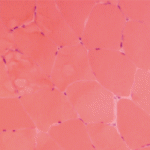NEW YORK (Reuters Health)—High-intensity statins are associated with a lower risk of joint replacement, new findings show. “Statins at high intensity may reduce the risk of hip and knee replacement. The effect may be RA specific,” Dr. Aliya Sarmanova of the University of Nottingham, U.K., and colleagues write in Rheumatology.1 Statins have anti-inflammatory effects, and…
Statins Linked to Idiopathic Inflammatory Myositis
NEW YORK (Reuters Health)—Statin use is associated with an increased likelihood of developing idiopathic inflammatory myositis (IIM), researchers from Australia report. “[Although] the incidence of IIM is rare, with the increasing use of statins worldwide and the severity of this condition, this study highlights the need for increased awareness of the condition and the importance…

Fellows’ Forum Case Report: Necrotizing Autoimmune Myopathy
Necrotizing autoimmune myopathy (NAM) is a relatively recently discovered subgroup of inflammatory myopathies. NAM is characterized by predominant muscle fiber necrosis and regeneration with little or no inflammation.1 One subgroup of NAM is 3-hydroxy-3-methylglutaryl-CoA reductase antibody (HMGCR Ab)-related immune-mediated necrotizing myopathy (IMNM), which occurs (rarely) after statin exposure, with a rough incidence of two per…
Lipids, Statin Treatment Linked to Revision Rate After Rotator Cuff Repair
NEW YORK (Reuters Health)—Elevated lipid levels are associated with an increased revision-surgery rate after arthroscopic rotator cuff repair, while statin use appears to mitigate that increase, according to a database review. “[Although] it supported our hypothesis, we found it interesting to finally demonstrate a link between hyperlipidemia and rotator cuff-repair failure resulting in revision surgery…

Myositis AutoantibodiesTriggered by Statins
CHICAGO—On a Saturday morning in Chicago, Chester V. Oddis, MD, director of the Myositis Center at the University of Pittsburgh, explained to a crowded room of about 500 rheumatologists attending the ACR’s State-of-the-Art Clinical Symposium in April how best to use myositis autoantibodies in clinical care. He began with an overview of the different types of…

Statins May Protect Against RA
A recent observational study found a link between high-intensity statin therapy and a 23% reduced risk of rheumatoid arthritis. Although further research is needed, researchers note this study “provides robust evidence of a protective effect of high-intensity statins on the risk of RA.”

Biomedical Research Key to Advancing Clinical Care for Rheumatic Diseases
WASHINGTON, D.C.—The importance of biomedical research to advancing clinical care with the ultimate goal of improving patients’ lives was on display during an ACR Discovery 2016 plenary session at the 2016 ACR/ARHP Annual Meeting. The session offered new ways to think about and treat select rheumatologic diseases, including research showing for the first time the…
Statins & the Risk of RA
Statins have anti-inflammatory/immunomodulatory effects that may be useful in preventing rheumatoid arthritis (RA), but previous observational studies about the risk of RA with statin use yielded conflicting results. In this large population-based study, high-intensity statin treatment was associated with a 23% reduced risk of RA when compared with low-intensity statin treatment. This is the largest study on the association of statins with RA risk to date, and the first to assess the effect of relative statin strength…

Biochemical Insights into Progeria Syndrome Identify Bisphosphonates, Statins as Possible Candidate Drugs to Halt Aging
Can We Stay Forever Young? May your heart always be joyful And may your song always be sung May you stay forever young Forever Young —Bob Dylan Beneath the rubric of orphan diseases reside some rare conditions and others that are extraordinarily uncommon. These are the diseases that most physicians either never to get to…
Statin Use Tied to Lower Risk of Inflammatory Bowel Disease
NEW YORK (Reuters Health)—Statin use is associated with a lower risk of developing inflammatory bowel disease (IBD), especially Crohn’s disease in older patients, new research suggests. “Prior studies have suggested that statins can decrease inflammation and may improve IBD in patients who already have the disease. To our knowledge, this is the first study to show…